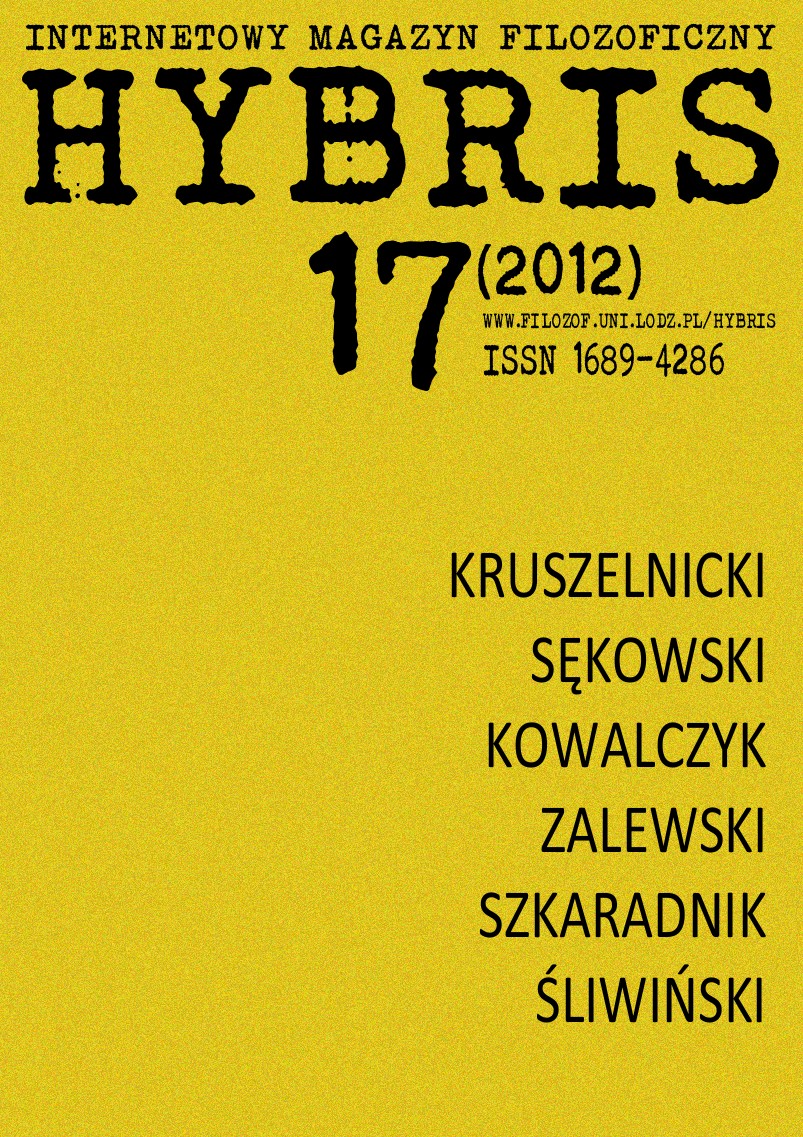Neuroteologia – naturalistyczna konceptualizacja doświadczenia religijnego
DOI:
https://doi.org/10.18778/1689-4286.17.03Słowa kluczowe:
neurologia, doświadczenie religijne, padaczka skroniowa, ewolucjaAbstrakt
The aim of this article is to test explanatory potential of neurotheology – interdisciplinary branch of science which main goal is to explain religious experience by using neuroimaging techniques as well as methods and terms of modern neurobiology.
In the introductory part of this paper, author tries to present general historical background of neurotheology and its philosophical outline. Subsequently, in the first chapter, author analyses assumptions and implications of localisationism - which is one of the two fundamental trends in neurotheology - based on studies of two prominent researchers: M. Persinger and V.S. Ramachandran. Chapter one also highlights impact of so called sacred disease – epilepsy - on neurotheology.
The next chapter is concerned with the second principal trend in neurotheology, namely, equipotentism. At this point author describes the advantages and disadvantages of this current through doing an analysis of Newberg’s and d’Aquili’s work.
In the last part of the article, author attempts to draw conclusions about explanatory capabilities and limits of neurotheology. The finding is that neurotheology offers tools and mechanisms only for narrowly defined religious experience and it should not be implemented to study of religion per se.
Bibliografia
Atran S. (2002), In Gods We Trust: The Evolutionary Landscape of Religion, Nowy Jork: Oxford University Press.
Zobacz w Google Scholar
Azari N.P. (2006), Neuroimaging Studies of Religious Experience: Critical Review, w: P. McNamara (red.), Where God and Science Meet. How Brain and Evolutionary Studies Alter Our Understanding of Religion, t. 2, Westport: Praeger Publishers Inc.
Zobacz w Google Scholar
Biello D. (2007), Searching for God in the Brain, [w]: “Scientific American Mind”, 5 (2007)
Zobacz w Google Scholar
DOI: https://doi.org/10.1038/scientificamericanmind1007-38
Buller D.J. (2009), Psychologia ewolucyjna w stylu pop, „Świat Nauki – Numer Specjalny”, 2 (2009).
Zobacz w Google Scholar
Dostojewski F. (1992), Idiota, przeł. J. Jędrzejewicz, Londyn: Puls.
Zobacz w Google Scholar
Glover D. (2008), James B. Ashbrook: Pioneer in Neurotheology, http://www.zygonjournal.org//ashbrook.htm (11.10.2010).
Zobacz w Google Scholar
Grzymała-Moszczyńska H. (2004), Religia a kultura. Wybrane zagadnienia z kulturowej psychologii religii, Kraków: Wydawnictwo Uniwersytetu Jagiellońskiego .
Zobacz w Google Scholar
Hill P.C., Hood R.W., Spilka B. (2009), The Psychology of Religion. An Empirical Approach, Nowy Jork: Guilford Press .
Zobacz w Google Scholar
Hitt J. (1999), This Is Your Brain on God, http://www.wired.com/wired/archive/7.11/persinger.html (22.12.2010).
Zobacz w Google Scholar
Horgan J. (2003), Rational Mysticism: Dispatches from the Border Between Science and Spirituality, Nowy Jork: Houghton Mifflin Harcourt .
Zobacz w Google Scholar
Kopaliński W. (2000), Słownik wyrazów obcych i zwrotów obcojęzycznych z almanachem, Warszawa: Świat Książki.
Zobacz w Google Scholar
Murphy G. (1928), A Note on Method in the Psychology of Religion, “Journal of Philosophy” 25 (1928).
Zobacz w Google Scholar
DOI: https://doi.org/10.2307/2014253
Naeser M. I in. (2005), Improved naming after TMS treatments in a chronic, global aphasia patient – case report, http://www.bu.edu/naeser/aphasia/papers/NaeserNeurocase05.pdf (23.12.2010).
Zobacz w Google Scholar
Newberg A., d’Aquili E., Rause V. (2001), Why God Won't Go Away: Brain Science and the Biology of Belief, Nowy Jork: Ballantine Books.
Zobacz w Google Scholar
Newberg A. i in. (2001), The measurement of regional cerebral blood flow during the complex cognitive task of meditation: A preliminary SPECT study, http://www.andrewnewberg.com/pdfs/2001/SPECTMedit9.pdf (02.02.2011).
Zobacz w Google Scholar
Newberg A. (2010), Principles of Neurotheology, Farnham: Ashgate.
Zobacz w Google Scholar
Persinger M. (1993), Transcendental meditation and general meditation are associated with enhanced complex partial epileptic-like signs: evidence for ''cognitive kindling''?, http://www.fdpsa.com/saludulas/PMS-February-1993_0016.pdf (27.12.2010).
Zobacz w Google Scholar
Persinger M. (2002), The temporal lobe: The biological basis of the God Experience, [w]: R. Joseph (red.), Neurotheology : Brain, science, spirituality, religious experience, San Jose: University Pr.
Zobacz w Google Scholar
Poczbut R. (2007), Wieloraka realizacja, http://www.filozoficznie.pl/4/41_R_Poczobut_Wieloraka_realizacja.pdf (1.02.2011).
Zobacz w Google Scholar
Ramachandran V.S., Blakeslee S. ( 1998), Phantoms in the Brain. Probing the Mysteries of the Human Mind, Nowy Jork: Harper Perennial.
Zobacz w Google Scholar
Ratcliffe M. ( 2006), Neurotheology: A Science of What?, w: P. McNamara (red.), Where God and Science Meet. How Brain and Evolutionary Studies Alter Our Understanding of Religion, t. 2, Westport: Praeger Publishers Inc .
Zobacz w Google Scholar
Runehov A. (2007), Sacred or Neural? The Potential or Neuroscience to Explain Religious Experience, Getynga: Vandenhoeck & Ruprecht .
Zobacz w Google Scholar
Sadowski B. (2007)., Biologiczne mechanizmy zachowania się ludzi i zwierząt, Warszawa: PWN.
Zobacz w Google Scholar
Saver J.L., Rabin J. (1997), The Neural Substrates of Religious Experience, http://neuro.psychiatryonline.org/cgi/reprint/9/3/498 (21.12.2010).
Zobacz w Google Scholar
DOI: https://doi.org/10.1176/jnp.9.3.498
Szyjewski A. ( 2008), Etnologia religii, Kraków: Nomos.
Zobacz w Google Scholar
Wójcik B. ( 2003), Neuroteologia – fakty i mity, „Zagadnienia Filozoficzne w Nauce”, 33 (2003).
Zobacz w Google Scholar
Wszołek S. (2004), Wprowadzenie do filozofii religii, Kraków: WAM.
Zobacz w Google Scholar
Wulff D. (1999), Psychologia religii. Klasyczna i współczesna, przeł. P. Jabłoński, M. Socha-Piekło, P. Socha, Warszawa: WSiP.
Zobacz w Google Scholar
Pobrania
Opublikowane
Jak cytować
Numer
Dział
Licencja

Utwór dostępny jest na licencji Creative Commons Uznanie autorstwa – Użycie niekomercyjne – Bez utworów zależnych 4.0 Międzynarodowe.






